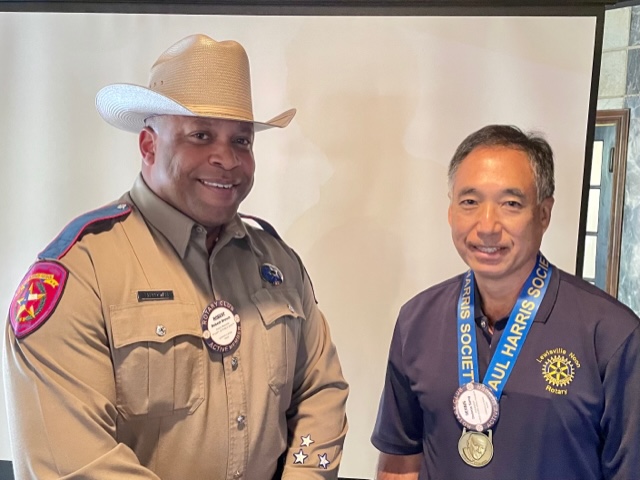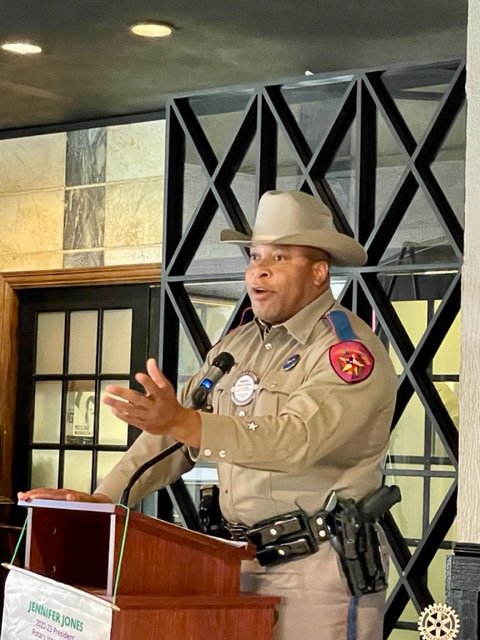
State Trooper Robert Brown poses with LNR president Dennis Song.
State Trooper Robert Brown elicited gasps of astonishment and heartfelt applause from fellow Rotarians during his presentation last week about the duties of a Texas state trooper.
Founded in 1929 as the Highway Motor Patrol, a division of the Texas Department of Public Safety, the Texas Highway Patrol has operated under its current name since 1935. The agency includes both state troopers and Texas Rangers, and currently has about 2,800 sworn troopers in its ranks.
For decades, a trooper’s main duties centered on highway patrol, issuing tickets for speeding and seatbelt violations. But times have radically changed.
“Right now, our main concern is the border,” said Trooper Brown, who has been with the agency for the past 18 years, after working eight years in the Texas state prison system. As the largest state-level law enforcement agency in the U.S., the Texas Highway Patrol now cracks down on international terror organizations, sex trafficking organizations, international gangs, and several other high-risk operations.
 The Texas New Mexico border is more than 1000 miles long, and Texas state troopers cover a border region measuring more than 65,000 miles, from El Paso to the Rio Grand Valley, said Trooper Brown, who also serves as Sergeant at Arms for the Lewisville Noon Rotary. Operation Lone Star, which aims to prevent illegal border crossings, not only costs the state millions of dollars annually, but causes tremendous mental and emotional stress for troopers, who are frequently shot at by bad actors or find themselves trying to block a tsunami wave of illegal immigrants crossing the border at one time.
The Texas New Mexico border is more than 1000 miles long, and Texas state troopers cover a border region measuring more than 65,000 miles, from El Paso to the Rio Grand Valley, said Trooper Brown, who also serves as Sergeant at Arms for the Lewisville Noon Rotary. Operation Lone Star, which aims to prevent illegal border crossings, not only costs the state millions of dollars annually, but causes tremendous mental and emotional stress for troopers, who are frequently shot at by bad actors or find themselves trying to block a tsunami wave of illegal immigrants crossing the border at one time.Although preventing people from crossing into U.S. territory illegally technically is the duty of U.S. border patrol agents, the current federal administration has dramatically reduced manpower along the border. As a result, Texas state troopers are on the frontlines to protect our nation, watching over every aspect of the border 24/7. They survey hundreds of miles with ground vehicles, marine units, and aircraft, to try and catch those who believe they are above the law.
Until recent years, one of the main concerns was drug smuggling, but now the focus is smuggling people, noted Trooper Brown. As a result, the work also has become exponentially more dangerous. “The cartel figured out they can make more money off humans than drugs,” earning about $3000-$5000 per body for women and men sold into sex trafficking and labor trafficking, he explained. The cartel also has put a hit out on troopers, who now have to work in pairs and are not even safe staying in hotels or restaurants within a hundred miles of the border. Even so, these brave men and women are willing to put their lives on the line to protect our nation's security.
“Until the federal government decides to do something else, we are the border patrol,” Trooper Brown said.